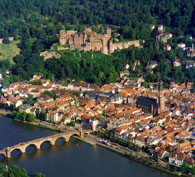XX Heidelberg Physics Graduate Days - Programme
Welcome
Welcome to the Physics Graduate Days. The courses are open for advanced students, in particular those working on their Diploma, Masterīs and Ph.D. theses. Our aim is to offer courses that broaden the physics knowledge of our students as well as to teach specialized techniques.
The Graduate Days take place for the 20th time this spring!
The courses are organized as parallel block lectures, with the morning lectures taking place from 9:30 to 12:30 and the afternoon lectures from 14:00 to 17:00, including coffee breaks. There is also a free lunch each day included in your registration. Note that each course runs every day for five days either in a morning or afternoon slot.
In addition to the courses, there is a special lecture on Monday evening, as well as the Hans Jensen lecture, which will take place on Wednesday. On Monday evening, snacks will be provided and on Thursday evening, there is a traditional barbeque, that is also covered with registration. To take part in the XX Graduate Days, please register yourself here.
The programme and the room allocation can now be downloaded here:
Programme and room allocation
Hans Jensen Invited Lecture
on Wednesday, 02.04.2008, at 17:30 (s.t.)
Physikalisches Institut, Philosophenweg 12, Großer Hörsaal
"From spinwaves to giant magnetoresistance (GMR)-sensors: the story of an invention"
Nobel Prize Winner in Physics, 2007.
Barbeque
After the Hans Jensen Invited Lecture, we will have the
Regular Course Programme
Morning Courses (Mo-Fr, 9:30 - 12:30)
Afternoon Courses (Mo-Fr, 14:00 - 17:00)
Additional Lecture
On Monday evening at 17:30 (s.t.), we will have an industry lecture, followed by a general welcome party.
Dr. Andre Schüngel from the Heidelberg company SNP will give a talk on
Unified Modelling Language for object oriented design - a blessing or a curse?

